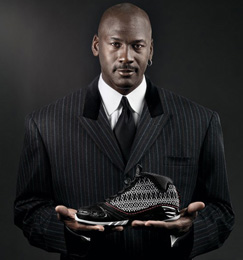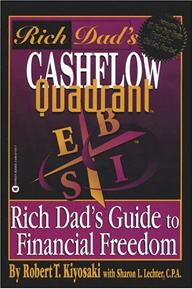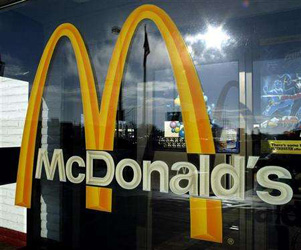
Last Sunday I threw up an article with a killer quote from the wealth building classic, Robert Kiyosaki’s Rich Dad Poor Dad. I wrote that quote out so that I can read it for a periodic kick in the ass.
Well, since then, I ‘ve gone back and taken a look at the book again–I hope you did the same (and if you don’t have a copy, get one asap). In particular, I cracked open my copy of Robert’s sequel, Rich Dad’s Cash Flow Quandrant.
Although these books are fairly general, they’ll get your head in the right place in terms of how you view work, build wealth, and invest. It’s then your job to fill in the gaps with all of the career specific details you need to execute your own game plan.
Today, I have an excellent excerpt for you from the book. Although this isn’t a specific fitness business or marketing tactic, it may be the most important thing you’ll read in a long time in terms of getting your business and life into perspective.
This ESPECIALLY applies to you if you’re a self-employed trainer. You may consider yourself a fitness business owner, but, once you read this little story from the book, you’ll realize you’re VERY mistaken.
I’m not calling anyone out, here; if you know what my story was in this industry before I opened my studio, you’ll know I was one of the most successful self- employed trainers in New York City. But, I was actually making a MONUMENTAL mistake in how I approached my training career (you can get the details in the free training course at mytrainingstudio.com).
It wasn’t til I started to understand the point Robert makes in the section below that things changed DRASTICALLY for me, and, once you get this, the same will happen for you. Enjoy and just let this sink in, and we’ll talk about the subject some more in the near future – take care.
****************************************************************

“Once upon a time there was a quaint little village. It was a great place to live except for one problem: The village had no water unless it rained. To solve this problem once and for all, the village elders decided to bid out a contract to have water delivered to the village on a daily basis. Two people volunteered to take on the task and the elders awarded the contract to both of them. They felt that a little competition would keep prices low and ensure a back-up supply of water.
The first of the two who won the contract, Ed, immediately ran out, bought two galvanized steel buckets and began running back and forth along the trail to the lake, which was a mile away. He began making money right away and labored from morning til dusk, hauling water from the lake with his two buckets and emptying them into the large concrete holding tank the village had built. Each morning he had to get up before the rest of the village awoke to make sure there was enough water for the villagers. It was hard work, but he was very happy to be making money and to have one of the two exclusive contracts for this project.
The second winning contractor, Bill, disappeared for a while. He was not seen for months, which made Ed very happy since he had no competition. Ed was making all the money.
Rather than buying two buckets to compete with Ed, Bill spent his time away writing a business plan, creating a corporation, finding four investors and employing a president to oversee the work. He returned six months later with a construction crew. Within a year his team had built a large-volume stainless steel pipeline that connected the village to the lake.

At the grand opening celebration of his business, Bill announced that his water was cleaner than Ed’s water; he knew that there had been complaints about dirt being found in Ed’s water. Bill also announced that he could supply the village with water 24 hours a day, 7 days a week. Ed could only deliver water on weekdays; he didn’t work on weekends.
Then Bill announced that he would charge 75% less than Ed did for the higher quality water and for his more reliable way of delivering it. The villlage cheered and ran immediately for the faucet at the end of Bill’s pipline.
In order to compete, Ed immedately lowered his rates by 75%, bought two more buckets, added covers to all four and began hauling four buckets each trip. In order to provide better service, he hired his two sons to give him a hand during the week and on the weekends. When his boys went off to college, he said to them,
‘Hurry back because someday this business will belong to you.’
For some reason, after college, his two sons never returned. Eventually, Ed acquired employees and union problems. The union demanded higher wages, better benefits, and wanted its members to only haul one bucket at a time.
Bill, on the other hand, realized that if his village needed water, other villages must need it too. He rewrote his business plan and went off to sell his high- speed, high-volume, low-cost, clean water delivery system to villages throughout the world. He only made a penny for every bucket he delivered, but delivers billions of buckets of water everyday. Whether he works or not, billions of people consume billions of buckets of water, and all that money pours into his bank account. Bill had developed a pipeline to deliver money to himself while delivering water to the villages.
Bill lived happily ever after while Ed worked hard for the rest of his life and had financial problems forever after. The End.”

once again, solid (even if you didn’t write it) –
Kaiser, this article was so amazing. You are my favorite blog on the internet and always have the most helpful information. It’s always exactly what I’m looking for. Thanks again!
You reader (and friend) for ever :-)
– Rachel
Great post Kaiser. I got a ton of value out of this, just like you said. I really look forward to all of your articles – keep them coming.
Wow man – this was a great quote kaiser. I read rich dad poor dad at least 10 years ago and haven’t read it since. I’ll be sure to do it now.
Very solid info kaiser – your info here is top notch.
Rich Dad/Poor Dad is a great book, and you’ve pulled out a great quote from it. You’re absolutely right – every trainer needs to learn this lesson. Great work and great site.
– Val
Great article Kaiser. You’re my role model in this business.
Kaiser, I have followed the posts for a couple of years now. What I have noticed(and Im not knocking you at all, just curious) is that in the beginning it was all about being a successful trainer and getting away from being a gym employee ASAP, to being an independent trainer, to centralizing your operation in a new studio, now to expanding your studio/gym. It just seems like the guidance has done a full circle and come right back to where they started….in a gym…although now as the owner….hamstringing other gym trainers like we used to be. Is that the ultimate goal?
Great quote Kaiser and great post. Love the blog buddy.